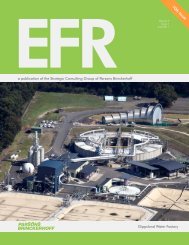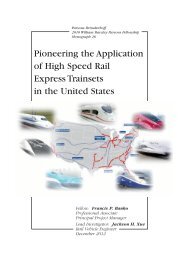Powering the Future Summary Report - Parsons Brinckerhoff
Powering the Future Summary Report - Parsons Brinckerhoff
Powering the Future Summary Report - Parsons Brinckerhoff
You also want an ePaper? Increase the reach of your titles
YUMPU automatically turns print PDFs into web optimized ePapers that Google loves.
<strong>Powering</strong> <strong>the</strong> <strong>Future</strong> <strong>Summary</strong> <strong>Report</strong><br />
<strong>Powering</strong> <strong>the</strong> <strong>Future</strong> <strong>Summary</strong> <strong>Report</strong><br />
Figure 8 shows <strong>the</strong> overall CO 2 reduction effects of<br />
<strong>the</strong> options, including changes of emissions in <strong>the</strong><br />
electricity sector, where appropriate, compared to <strong>the</strong><br />
‘business as usual’ case. Electricity sector emissions<br />
are based on indicative levels of 0.4 tCO 2 /MWh in 2020<br />
and 0.1 tCO 2 /MWh in 2050.<br />
Certain measures are excluded from <strong>the</strong> reference<br />
scenario. Biomass CHP, while offering useful CO 2<br />
reductions, is not included as <strong>the</strong>re is insufficient<br />
biomass available for <strong>the</strong> large energy demands of<br />
industry. Electrical efficiency and conversion to gas<br />
have only a small impact which could be considered<br />
part of <strong>the</strong> continuous process of energy efficiency<br />
improvement in industry.<br />
The large process efficiency improvement required to<br />
reduce industry sector emissions by 2050 represents<br />
a major financial challenge to industry. Funding <strong>the</strong><br />
development and application of <strong>the</strong> necessary new<br />
technologies could undermine <strong>the</strong> competitiveness of<br />
UK industry.<br />
While we were preparing <strong>Powering</strong> <strong>the</strong> <strong>Future</strong>, major<br />
UK businesses voiced <strong>the</strong>ir concern to us that <strong>the</strong><br />
inadvertent costs of carbon trading and improvement<br />
programmes could force producers offshore. This<br />
would damage <strong>the</strong> UK economy directly by <strong>the</strong> loss of<br />
employment and indirectly by increasing imports. The<br />
latter would increase global CO 2 emissions through<br />
<strong>the</strong> use of less advanced processes and international<br />
transport – <strong>the</strong> exact reverse of <strong>the</strong> intent of such<br />
measures.<br />
Figure 8 Industry measures - net CO 2 reduction on sector emissions<br />
23:24

















